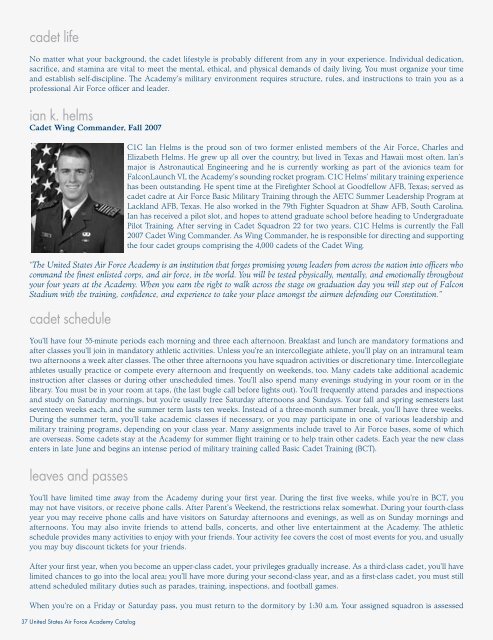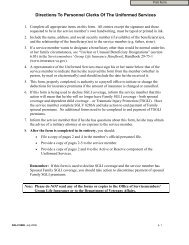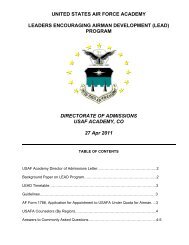USAFA - United States Air Force Academy
USAFA - United States Air Force Academy
USAFA - United States Air Force Academy
You also want an ePaper? Increase the reach of your titles
YUMPU automatically turns print PDFs into web optimized ePapers that Google loves.
cadet life<br />
No matter what your background, the cadet lifestyle is probably different from any in your experience. Individual dedication,<br />
sacrifice, and stamina are vital to meet the mental, ethical, and physical demands of daily living. You must organize your time<br />
and establish self-discipline. The <strong>Academy</strong>’s military environment requires structure, rules, and instructions to train you as a<br />
professional <strong>Air</strong> <strong>Force</strong> officer and leader.<br />
ian k. helms<br />
Cadet Wing Commander, Fall 2007<br />
37 <strong>United</strong> <strong>States</strong> <strong>Air</strong> <strong>Force</strong> <strong>Academy</strong> Catalog<br />
C1C Ian Helms is the proud son of two former enlisted members of the <strong>Air</strong> <strong>Force</strong>, Charles and<br />
Elizabeth Helms. He grew up all over the country, but lived in Texas and Hawaii most often. Ian’s<br />
major is Astronautical Engineering and he is currently working as part of the avionics team for<br />
FalconLaunch VI, the <strong>Academy</strong>’s sounding rocket program. C1C Helms’ military training experience<br />
has been outstanding. He spent time at the Firefighter School at Goodfellow AFB, Texas; served as<br />
cadet cadre at <strong>Air</strong> <strong>Force</strong> Basic Military Training through the AETC Summer Leadership Program at<br />
Lackland AFB, Texas. He also worked in the 79th Fighter Squadron at Shaw AFB, South Carolina.<br />
Ian has received a pilot slot, and hopes to attend graduate school before heading to Undergraduate<br />
Pilot Training. After serving in Cadet Squadron 22 for two years, C1C Helms is currently the Fall<br />
2007 Cadet Wing Commander. As Wing Commander, he is responsible for directing and supporting<br />
the four cadet groups comprising the 4,000 cadets of the Cadet Wing.<br />
“The <strong>United</strong> <strong>States</strong> <strong>Air</strong> <strong>Force</strong> <strong>Academy</strong> is an institution that forges promising young leaders from across the nation into officers who<br />
command the finest enlisted corps, and air force, in the world. You will be tested physically, mentally, and emotionally throughout<br />
your four years at the <strong>Academy</strong>. When you earn the right to walk across the stage on graduation day you will step out of Falcon<br />
Stadium with the training, confidence, and experience to take your place amongst the airmen defending our Constitution.”<br />
cadet schedule<br />
You’ll have four 55-minute periods each morning and three each afternoon. Breakfast and lunch are mandatory formations and<br />
after classes you’ll join in mandatory athletic activities. Unless you’re an intercollegiate athlete, you’ll play on an intramural team<br />
two afternoons a week after classes. The other three afternoons you have squadron activities or discretionary time. Intercollegiate<br />
athletes usually practice or compete every afternoon and frequently on weekends, too. Many cadets take additional academic<br />
instruction after classes or during other unscheduled times. You’ll also spend many evenings studying in your room or in the<br />
library. You must be in your room at taps, (the last bugle call before lights out). You’ll frequently attend parades and inspections<br />
and study on Saturday mornings, but you’re usually free Saturday afternoons and Sundays. Your fall and spring semesters last<br />
seventeen weeks each, and the summer term lasts ten weeks. Instead of a three-month summer break, you’ll have three weeks.<br />
During the summer term, you’ll take academic classes if necessary, or you may participate in one of various leadership and<br />
military training programs, depending on your class year. Many assignments include travel to <strong>Air</strong> <strong>Force</strong> bases, some of which<br />
are overseas. Some cadets stay at the <strong>Academy</strong> for summer flight training or to help train other cadets. Each year the new class<br />
enters in late June and begins an intense period of military training called Basic Cadet Training (BCT).<br />
leaves and passes<br />
You’ll have limited time away from the <strong>Academy</strong> during your first year. During the first five weeks, while you’re in BCT, you<br />
may not have visitors, or receive phone calls. After Parent’s Weekend, the restrictions relax somewhat. During your fourth-class<br />
year you may receive phone calls and have visitors on Saturday afternoons and evenings, as well as on Sunday mornings and<br />
afternoons. You may also invite friends to attend balls, concerts, and other live entertainment at the <strong>Academy</strong>. The athletic<br />
schedule provides many activities to enjoy with your friends. Your activity fee covers the cost of most events for you, and usually<br />
you may buy discount tickets for your friends.<br />
After your first year, when you become an upper-class cadet, your privileges gradually increase. As a third-class cadet, you’ll have<br />
limited chances to go into the local area; you’ll have more during your second-class year, and as a first-class cadet, you must still<br />
attend scheduled military duties such as parades, training, inspections, and football games.<br />
When you’re on a Friday or Saturday pass, you must return to the dormitory by 1:30 a.m. Your assigned squadron is assessed




